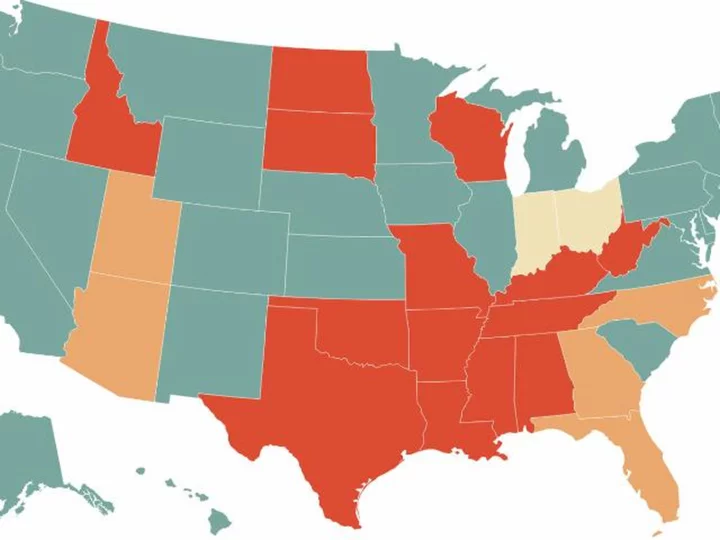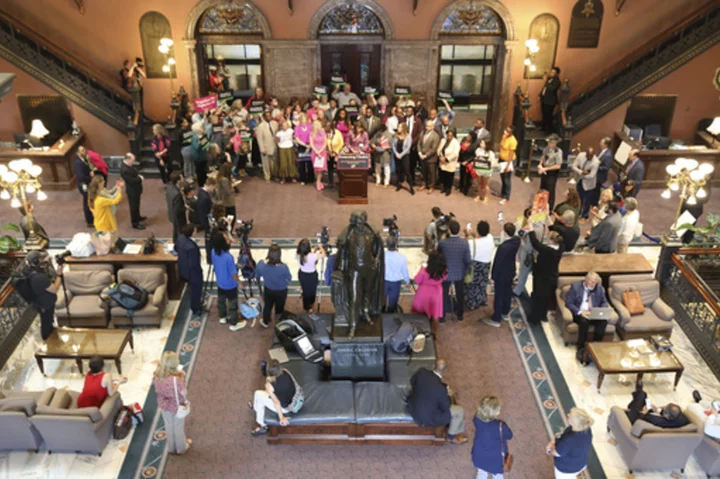The evolving patchwork of access to abortion care is going through big changes this week, with the entire Southeast on the brink of imposing new limits.
Bands of states restricting abortion access could soon extend the entire length of the country, depending on legislative action and pending court battles.
Major developments this week
► Republican lawmakers in North Carolina overrode their Democratic governor's veto, moving to ban most abortions after 12 weeks of pregnancy. Under current state law, abortions are legal up to 20 weeks of pregnancy.
The new law, which takes effect July 1, also imposes new requirements for medication abortion, which now accounts for the vast majority of US abortions and is approved by the US Food and Drug Administration to be conducted up to 10 weeks of pregnancy.
North Carolina Republicans got the supermajority they needed when a Democrat who had previously supported abortion rights, state Rep. Tricia Cotham, changed parties.
► In South Carolina, a total abortion ban was blocked earlier this year by a bloc of female lawmakers, including several Republicans. But this week, the legislature is on pace to restrict abortion after six weeks.
The bill is known as the "Fetal Heartbeat and Protection from Abortion Act," and would ban most abortions after early cardiac activity can be detected in a fetus or embryo. Such activity can commonly be detected as early as six weeks into pregnancy, before many women know they are pregnant, according to CNN's report.
South Carolina state Sen. Penry Gustafson, who helped defeat the total abortion ban, told CNN's Christiane Amanpour this month that she considers herself to be "pro-life," but that neither she nor most South Carolinians support a total ban.
"The Republican consensus is that we do need restrictions," Gustafson said. "There's a range of that between zero weeks and 12 weeks." She supports a six-week ban in South Carolina and opposes a federal abortion ban.
► In Nebraska's unicameral and nonpartisan legislature, after lawmakers earlier this year failed to impose a six-week ban, they voted this week to include a 12-week abortion ban in a bill to ban transgender health care for minors.
► Nationally, the legality of medication abortion has been challenged and an appeals court hearing Wednesday in New Orleans will set the stage for how the case is ultimately brought to the Supreme Court, which has kept the drug mifepristone available for now.
RELATED: See where abortions are banned and legal — and where it's still in limbo
The actions in the Carolinas -- assuming the six-week ban ultimately passes in South Carolina -- mean that the entire Southeast, from North Carolina over to Oklahoma, and from Florida east to Texas, will have restricted access to abortion care far beyond what was available under Roe v. Wade.
More restrictions pending
The restrictions continue to the north in Kentucky, where voters last November rejected placing anti-abortion rights language in the state's constitution, but legislators have so far left in place a near-total abortion ban during an ensuing court fight.
The abortion restriction zone could soon extend further north to include Indiana, Ohio and Iowa, where legislatures have passed more restrictive laws but abortion rights remain in limbo during court fights.
In Ohio, voters could get two chances to make their feelings known. In August, Republican lawmakers want to ask voters to decide whether to make it more difficult to change the state's constitution. In November, abortion rights activists want to ask voters to change the state's constitution to guarantee abortion rights. Read more about developments in Ohio.
Related: These bans may feel arbitrary to women facing difficulty in pregnancy. CNN reported back in February about an Ohio couple who agonized over how to deal with an unborn child who had organs outside her body -- state law there allows for abortions up to 22 weeks of pregnancy.
In Florida, Republicans who control the state government have also passed legislation to restrict abortion access to six weeks of pregnancy, beyond the current restriction of 15 weeks -- but again, there is ongoing litigation.
Where voters have spoken
In Kansas, like Kentucky, voters last year rejected the idea of amending the state constitution to say that a right to abortion is not guaranteed.
That trend carried into the midterm elections in 2022, when voters in red and blue states either moved to protect abortion rights in their state constitutions or reject proposals to further restrict them.









